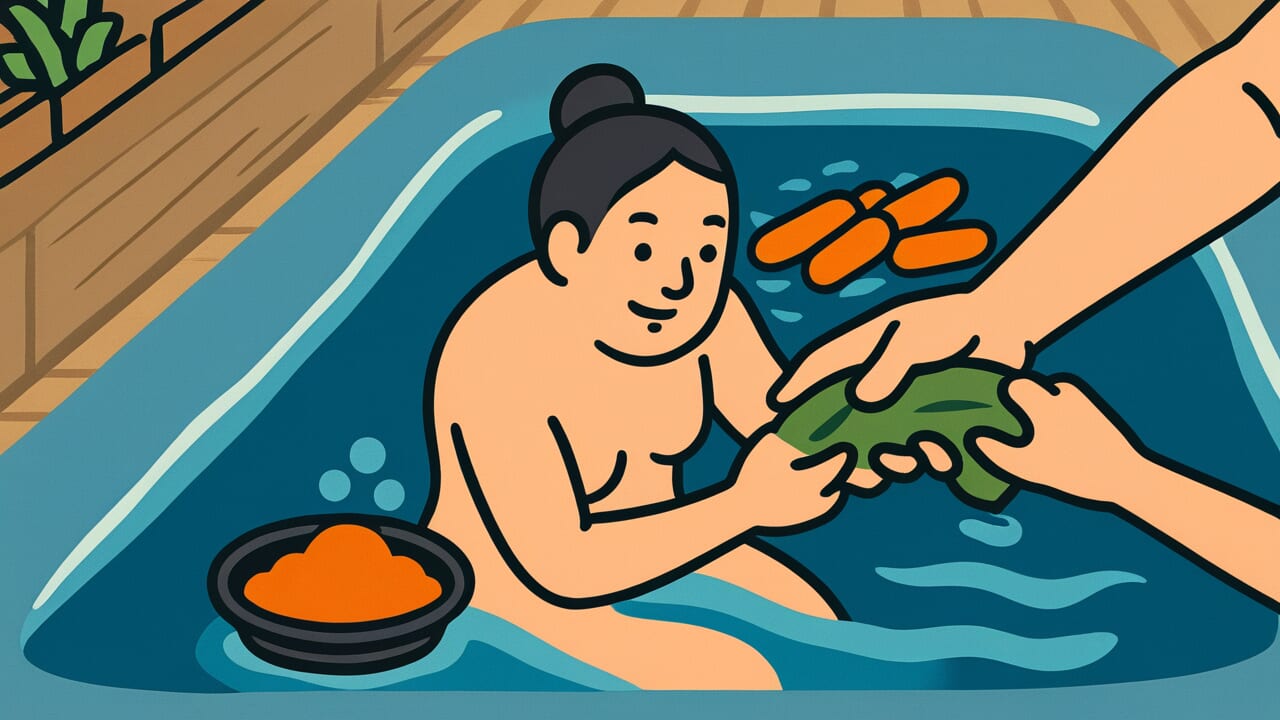How to Read “Taking a bath with a carrot”
Ninjin de gyōzui
Meaning of “Taking a bath with a carrot”
“Taking a bath with a carrot” is a proverb that describes exhausting all possible medical treatments to cure someone. It uses the extreme image of giving someone enough ginseng decoction to bathe in, showing the attitude of trying every possible means to cure an illness.
This proverb is mainly used when treating serious illnesses or caring for loved ones, sparing no expense to provide the best medical care. It doesn’t simply mean receiving expensive treatment. It carries the seriousness and devotion of doing everything humanly possible.
Today, medical technology has advanced and many treatment options are available. But the essence of this proverb remains unchanged. It expresses the desire to seek the best treatment for loved ones and the attitude of providing all possible medical support.
Even now, when medical costs are a major social concern, situations involving life and death sometimes demand the kind of resolve shown in “Taking a bath with a carrot.”
Origin and Etymology
The exact first appearance of this proverb in literature is unclear. However, its components reveal an interesting background.
“Ninjin” doesn’t refer to the common carrot vegetable. It means Korean ginseng, also called Goryeo ginseng. Korean ginseng has long been treasured as the finest medicinal ingredient in East Asia. Its price was so high that ordinary people couldn’t afford it.
Even in Edo-period Japan, Korean ginseng was considered as valuable as gold. Only the shogun’s family and feudal lords could obtain this precious item.
“Gyōzui” originally means a simple bathing method using a basin of water to wash the body. But in this proverb, it means drinking massive amounts of ginseng decoction, enough to bathe in.
In other words, it’s an extreme expression. It describes using an expensive medicine so lavishly that you could bathe in it, when even drinking it would be extravagant.
Behind this phrase lies a desperate desire to cure illness. It became established as an expression of human love and desperation. It shows the willingness to spare no expense, no matter how costly the medicine, to save a loved one’s life.
Interesting Facts
In the Edo period, Korean ginseng was valued equal to or more than gold. The shogunate encouraged domestic cultivation. During the time of the eighth shogun, Tokugawa Yoshimune, cultivation was attempted in Nikko and Nagano.
Successful domestication gradually increased the supply. Still, it remained out of reach for common people. This shows just how extravagant and extreme the expression “Taking a bath with a carrot” really is.
Usage Examples
- Since grandfather’s illness worsened, father has been trying cutting-edge treatments one after another, like taking a bath with a carrot
- She spent money on her dog’s treatment like taking a bath with a carrot, but says she has no regrets
Universal Wisdom
The proverb “Taking a bath with a carrot” captures the depth of human love. It shows the instinctive desire to protect what matters most. This proverb has been passed down through generations because it captures universal human psychology.
When facing the fear of losing someone truly precious, everyone sometimes acts beyond rational judgment. Cost-effectiveness and rationality lose meaning before a loved one’s life. Instead, the thought of regretting not doing everything possible drives people forward.
This psychology applies to many life situations beyond medicine. In children’s education, parent care, and relationships with partners, being able to say “I did everything I could” holds important meaning. It’s not mere self-satisfaction.
It’s a human endeavor to prove one’s sincerity and minimize regret.
At the same time, this proverb hints at the danger of devotion beyond limits. The extreme expression of “drinking enough to bathe in” can be read as a warning against excessive actions that lose composure.
How to balance love and reason is another universal challenge humans have long faced.
When AI Hears This
From a thermodynamics perspective, trying to wash your body with minimal water reveals remarkable inefficiency. Entropy is simply the degree of disorder. Body dirt is a high-entropy state, meaning a disordered state.
Returning it to a low-entropy state, meaning cleanliness, requires appropriate energy input.
What’s important is that reducing entropy requires a minimum necessary amount of energy. For example, with a body surface area of about 1.6 square meters, physically removing dirt like sebum and sweat requires at least several liters of water.
Taking a bath with a carrot, meaning extremely little water, can’t even complete the basic process of dissolving and washing away dirt. Instead, it just dilutes the dirt and redistributes it across the body surface. Overall entropy barely decreases.
More interesting is that halfway energy input falls into a “reversibility trap.” Small amounts of water don’t completely remove dirt, which reattaches to the body after drying. The invested energy is not only wasted but returns to the original state.
The second law of thermodynamics teaches that maintaining order requires continuous and sufficient energy input. What seems like frugality becomes the most inefficient choice. This is the paradox here.
Lessons for Today
This proverb teaches modern people what sincerity toward important things really means. We live daily lives prioritizing within limited time and resources. But truly important moments sometimes demand decisions beyond calculation.
However, what’s crucial is understanding the difference between “doing your best” and “blindly investing resources.” True sincerity isn’t being swept away by emotion. It’s making choices without regret while calmly assessing the situation.
In modern society, we face “how far should I go” decisions in many areas. Not just medicine, but careers, relationships, and self-investment. In such times, this proverb offers guidance.
It means having the resolve to spare no effort for what truly matters. But that decision shouldn’t be emotional recklessness. It should be based on deep consideration.
What in your life is worth “Taking a bath with a carrot”? Knowing that answer is the key to living a fulfilling life.



Comments